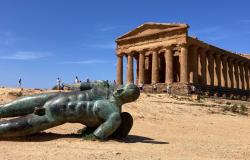The electoral campaign for the European elections does not warm spirits. We talk more about national policies, often superficial, than about European policies. The rising nationalist wind leads to short-lived proposals, precisely when the opposite would be needed: Italy, like other European nations, would count for nothing in the world if there were no Europe. Not this Europe, but a Europe with another route. This should be discussed.
In La Spezia the Mediterranean Cultural Association, the Circolo Pertini and Legambiente are trying to do so, with a series of meetings that will end tomorrow with Fabrizio Barca, co-coordinator of the Inequalities and Diversity Forum, who will present the book “Which Europe”. The objective is to offer to the public debate some features of the European Union that would serve social and environmental justice and peace: an informative and comparative contribution, a yardstick for judging – before and after the elections – programs, parties, candidates and elected representatives , a compass for civic monitoring of the actions that the European Union will carry out in the next legislature.
Social justice: after the post-war improvements, the data on poverty and inequalities mercilessly describe a constant worsening for thirty years now. The share of wealth held by the richest 1% of individuals has increased considerably, while the share of wealth of the poorest 50% has shrunk dramatically. Italy, in particular, has become much more unjust. Just as the disparities between different European countries have increased. If this trend is not reversed, popular support for the European project will increasingly decline, and nationalistic and Eurosceptic pressures will grow. The issues are not only those of the minimum wage, citizenship income, pensions: the issue of welfare, and above all healthcare, is also central. It is thanks to our universalistic healthcare systems that we Europeans live five years longer than in the United States, where the privatization that we are recklessly adopting as a model exists.
Environmental justice: the climate crisis and environmental changes affect those who are worse off the most and, on the contrary, those who are worse off risk being more penalized by countermeasures. This favors those who intend to ride the fear of change by putting the “social” against the “environmental”. Furthermore, the environmental crisis is leading to the destruction of nature and questions us about the senselessness of policies that commodify natural resources. The ecological transition must be fast and fair, involving and giving clear answers to the needs of those who live in resentment and precariousness.
Peace: the third world war in pieces has already begun, but Europe does not know how to work for peace, neither in the war in Ukraine nor in the war in Gaza. Yet the Europe of the foundation was above all a Europe of peace. The war has aggravated social and environmental injustice, because spending on rearmament diverts resources in favor of the weakest; and it has exacerbated the environmental crisis, pushing for gas and nuclear, delaying the abandonment of fossil fuels in favor of renewable energy. We must fight against the hit-and-run tourism model and finally reevaluate industry and technology, with European public investments. But today’s Europe, not surprisingly presided over by a former German Defense Minister, hopes for a return to austerity – after the change of heart due to the pandemic – with the sole exception of expenses for military rearmament. We need an industrial policy, not a militarized Europe.
We discuss the common defense of an integrated Europe. I am a pacifist: however, in a phase of transition towards disarmament, I understand the necessity. But every defense presupposes the definition of a foreign policy. A common defense without a European foreign policy is in fact – and inevitably – at the service of NATO and the American political power that leads it.
The plan is clear: a new cold war, a bipolar confrontation between the West and Russia and China, the emerging power. But this configuration of world politics, in addition to generating the risk of a catastrophic war, is incompatible with another plan: a united and independent Europe, always respectful of international law, no matter who violates it. As Giangiacomo Migone wrote:
“The construction of a European defense suited to this reality would not have the dimensions and costs of a Euro-Atlantic configuration, allowing economies of scale deriving from the elimination of duplications imposed by NATO rules”.
We are also talking about our city, home to arms industries. And of an Arsenal where NATO – with the Blue Bases project – imposes duplications, and the use of the areas to the west for the piers it needs, without any return of the sea to the community.
As Emmanuel Todd states, the war in Ukraine is a secondary issue in a much larger story: that of the ongoing battle between a declining global hegemonic power, the United States and with it Western countries, and a rising one, China and with it India and other emerging countries. We have entered the Asian century. The Ukrainian war was supposed to resize Russia, consolidating the “Atlantic” blockade around the United States, necessary to support American power against China, also cutting fundamental commercial ties for Europe: any person with common sense understands that we are interested in the Way of Silk. Strategically, however, the war brought Russia closer to China, which is the real competitor for hegemony.
We must prevent Europe from making the tragic mistake of contributing to the new cold war, which is already very hot today. As Piergiorgio Ardeni and Francesco Sylos Labini wrote, “however, it is doubtful whether China really wants to take over the role of the USA today. China is gaining global hegemony on an economic level, which is much more solid and extensive than the military one.” The data confirms this: China spends much less on weapons than the USA, but also than Europe. China spends on technology, research, development, education. Europe is making a mistake: it must not push for war, it must act as a bridge between the American ally and the emerging world. This is our future.
This is why the European elections are important. We must understand, discuss, choose: my choice – I hope it is that of many – is for a Europe of social and environmental justice and peace. It is the Europe that Altiero Spinelli outlined in the Ventotene manifesto, much cited and almost never read.
There are ways to build this Europe. The time has come to travel them. I know well that there are no European parties capable of doing this. But it is good not to give up on voting: you can focus on a “cloud” of progressive and pacifist parliamentarians, candidates from the left, from social democracy, from the greens and, in Italy, from the Five Star Movement, who can make a difference, producing convergences on a ‘alternative. And accompany this patrol with the mobilization and civil participation of citizens.

» read all about www.cittadellaspezia.com






